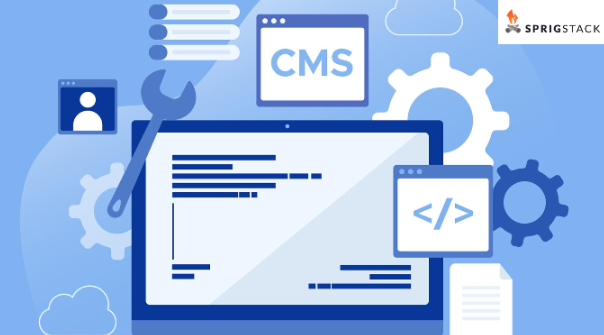
Content Management Made Easy: Benefits of Using a CMS in Web Development
You may do difficult tasks with ease if you combine custom website development services with a content management system (CMS). Have you ever had a distinct idea for a website and been frustrated by the constraints of a pre-built website? Imagine a scenario in which you can easily change your website while still having the option of custom development to accomplish complex objectives.
A CMS is an easy-to-use control panel for your website. Consider it as intuitive software that lets you produce, organize, and modify content for websites without requiring you to know how to write complicated code. Just a few clicks on this user-friendly dashboard integrated into your website will enable you to make changes and adjustments.
By giving you control over the daily operations of your website, a CMS has a good effect. You may make sure your website accurately represents your business, update it regularly, and maintain fresh material. When dealing with busy online environments, you can react quickly and nimbly.
But what about those unique website features or complex functionalities? It is here where custom web development services come in handy. By customizing your website to meet your specific needs, custom development benefits you. Think of it as having a skilled developer craft bespoke solutions that a CMS might not offer out of the box. They can create custom features, integrate with specialized applications, or design unique user experiences that set your website apart.
The key is finding the right balance. A CMS empowers you for day-to-day management, while custom development services tackle complex website challenges. This combined approach allows you to create a website that’s both user-friendly and strategically powerful, ultimately maximizing the positive impact your website has on your business goals.
 Benefits of Using a CMS
Benefits of Using a CMS
- Easy as Editing: Forget complex coding! A CMS provides a user-friendly interface that works like your favorite editing software. Adding text, images, and videos becomes a breeze, allowing anyone on your team to update content without needing programming knowledge.
- Content Organization: Keeping an information-rich website under control can quickly turn into a disaster. A content management system (CMS) uses custom post kinds and tags to help you stay organized. This facilitates the easy management and retrieval of particular information whenever needed by allowing you to classify material such as blog entries, product pages, or events.
- Teamwork: Content creation frequently involves teamwork. A CMS gives your team more authority by granting various user roles with particular rights. Before content is published online, editors can check and approve it, guaranteeing a professional and consistent website that represents your business.
- Flexibility and Growth: Your website should adapt as your business grows. A CMS offers flexibility by allowing you to easily add new features and functionalities. You can extend your website’s capabilities through plugins and themes without needing a complete rebuild. Think of it like adding new features to your phone with apps – a CMS lets you do the same for your website.
- Search Engine Friendly: Do you want people to find your website with ease? You will appear higher in search engine results if you use a CMS. Search engines find it easier to comprehend and index your material when it has features like well-formed website addresses (URLs) and straightforward metadata management, which increases organic website traffic.
- Save Time & Money: Building a website from the ground up and keeping it updated can be expensive. A CMS reduces the need for unique coding, making it an affordable alternative. Additionally, the CMS platform itself frequently handles updates and bug fixes, saving you money on ongoing maintenance expenses and freeing up your time to concentrate on what really matters.
 Popular CMS Platforms
Popular CMS Platforms
WordPress:
Imagine a website builder overflowing with possibilities. That’s WordPress! It’s renowned for its user-friendly interface, making it a great choice for beginners. Even without coding experience, you can start quickly and build a beautiful website. But WordPress doesn’t stop there. Its true strength lies in its vast library of plugins. Think of plugins as mini apps that add specific functionalities to your website. Need a contact form? There’s a plugin for that. Want to sell products online? Another plugin can transform your website into a full-fledged online store.
This immense flexibility makes WordPress a favorite for businesses of all sizes. Plus, a massive online community offers endless support and resources, so you’re never on your own. However, with all this power comes more complexity than Wix.
Wix:
If you prioritize ease of use, Wix might be your website-building soulmate. Imagine building your website like a child arranging colorful blocks. Wix uses a drag-and-drop functionality, allowing you to visually design your website layout simply by clicking and dragging elements. No coding knowledge is required! Wix also offers a wide range of beautiful pre-designed templates to get you started quickly, even if you have no design experience.
This user-friendly approach makes Wix ideal for creating simple websites for individuals, startups, or showcasing portfolios. Adding complex functionalities might be challenging, and customization options are more limited.
Shopify:
Suppose you had a personal helper for your internet store. Designed with e-commerce in mind, Shopify is an all-purpose powerhouse. All sizes of businesses wishing to sell online will find it suitable because of its features, which include built-in marketing tools, secure payment methods, and product administration.
Squarespace:
Imagine sleek, contemporary websites that are also easy to navigate. Squarespace is widely recognized for its sophisticated pre-designed themes and intuitive drag-and-drop interface. For anyone looking for a professional-looking website that doesn’t require a lot of design knowledge, this makes it an excellent option.
Magento:
If an outstanding e-commerce control center is what you’re looking for, Magento might be the answer. Large-scale, scalable web storefronts are frequently constructed using this reliable open-source technology. With a high level of flexibility and control over every element of your site, Magento is best suited for companies with sophisticated e-commerce requirements and a strong technical foundation. Its flexibility does come with a higher learning curve in terms of technical setup and management, though.
 CMSWrapping up:
CMSWrapping up:
In conclusion, there is no denying the advantages of utilizing a CMS in web development. These platforms are essential resources for anyone entering the internet space, as they simplify content management while also increasing SEO and cutting expenses.
Please get in touch if you have any questions or are prepared to make the move. We can support you with your web development endeavors or help you investigate well-known content management systems.
You are undoubtedly convinced by this point that a content management system (CMS) will revolutionize the web development industry. It gives you the ability to interact efficiently, easily manage the material on your website, and enhance the overall functionality of your website. Are you prepared to discover the magic of a CMS? Visit well-known websites like WordPress or Wix, or get in touch with us to talk about the ideal CMS for your particular requirements.
Read more: Can Good Web Development Boost Your ROI?



